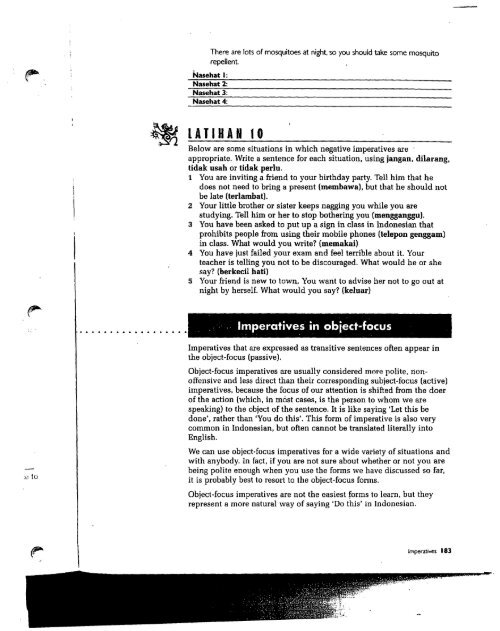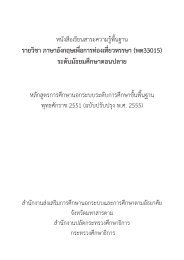bahasa indonesia
djenar-2003-a-students-guide-to-indonesian-grammar-oxford
djenar-2003-a-students-guide-to-indonesian-grammar-oxford
- No tags were found...
Create successful ePaper yourself
Turn your PDF publications into a flip-book with our unique Google optimized e-Paper software.
There are lots of mosquitoes at night, so you should take some mosquito<br />
repellent<br />
hasehat I:<br />
Nasehat 2:<br />
Nasehat 3:<br />
Nasehat 4:<br />
S'4<br />
Below are some situations in which negative imperatives are .<br />
appropriate. Write a sentence for each situation, using jangan, dilarang,<br />
tidak usah or tidak perlu.<br />
1 You are inviting a friend to your birthday party. Tell him that he<br />
does not need to bring a present (membawa), but that he should not<br />
be late (terlambat).<br />
2 Your little brother or sister keeps nagging you while you are<br />
studying. Tell him or her to stop bothering you (mengganggu).<br />
3 You have been asked to put up a sign in class in Indonesian that<br />
prohibits people from using their mobile phones (telepon genggarn)<br />
in class. What would you write? (memakai)<br />
4 You have just failed your exam and feel terrible about it. Your<br />
teacher is telling you not to be discouraged. What would he or she<br />
say? (berkecil hati)<br />
5 Your Wend is new to town, You want to advise her not to go out at<br />
night by herself. What would you say? (keluar)<br />
Imperatives that are expressed as transitive sentences often appear in<br />
the object-focus (passive).<br />
Object-focus imperatives are usuallv considered more polite, nonoffensive<br />
and less direct than their corresponding subject-focus (active)<br />
imperatives, because the focus of our attention is shifted from the doer<br />
of the action (which, in most cases, is the person to whom we are<br />
speaking) to the object of the sentence. It is like saying 'Let this be<br />
done', rather than 'You do this'. This form of imperative is also very<br />
common in Indonesian, but often cannot be translated literally into<br />
English.<br />
We can use object-focus imperatives for a wide variety of situations and<br />
with anybody. In fact, if you are not sure about whether or not you are<br />
being polite enough when you use the forms we have discussed so far,<br />
it is probably best to resort to the object-focus forms.<br />
Object-focus imperatives are not the easiest forms to learn, but they<br />
represent a more natural way of saying 'Do this' in Indonesian.<br />
Imperatives 183



